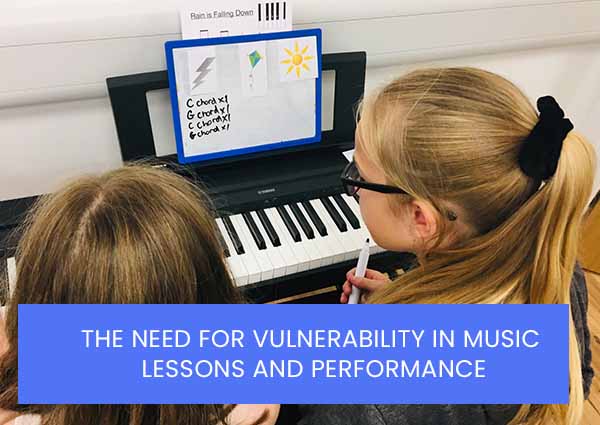THE NEED FOR VULNERABILITY IN MUSIC LESSONS AND PERFORMANCE
Learning and improving a new talent can be intimidating, and some people may view it as a danger. I’ve learned the importance of vulnerability in the music learning and making processes during my time as a professional musician and instructor.
What is Vulnerability?
The Oxford English Dictionary defines vulnerability as “the quality or state of being exposed…either physically or emotionally.” It might have either positive or negative consequences. Vulnerability, however frightening it may be, can improve a musician’s emotional sensitivity and the overall quality of their performance.
Within the sphere of music, being vulnerable is a complex and changeable act. It might range from being willing to move outside of your comfort zone and take up music classes to having the confidence to perform emotionally charged songs in front of complete strangers.
In its most basic form, music is intended to convey a narrative, transmit feelings, and allow basic human connection. These impacts are weakened without the musician’s vulnerability.
Vulnerability’s Affect on Music Performance
Some people believe that the most difficult part of learning something new, such as signing up for music lessons, is taking the initial step. While this is true, vulnerability only rises as an undertaking, such as music producing, progresses.
The Vulnerability Hierarchy is depicted in the graphic below, which shows how intricate and multifaceted it may be. Most, if not all, of these vulnerability categories can be included into music instruction and performance.
Vulnerability comes in a variety of shapes and sizes.
Personally, I find that singing vocally rather than with a tangible instrument makes me feel more vulnerable. Because I can’t physically separate or detach myself from my vocal instrument, I’m more prone to self-doubt, worry, and pessimism when it comes to my voice than with the other instruments I play.
Understanding my vulnerability and being open to new chances, such as performing or learning new skills, enable me to make music to the best of my ability, whether vocally or instrumentally.
Vulnerability becomes even more important on a wider scale of performance. Instead of being open and present in a one-on-one lesson, a performer (of any ability) must emote to a group of peers and/or strangers, which is incredibly challenging.
Vulnerability’s Affect on Music Instruction
In terms of teaching, I want to set an example for my students by recognising and acknowledging their own vulnerabilities. This aids in the development of the best, most confident musicians possible.
In my studio, I have my piano and voice students do some quite funny or embarrassing exercises. No matter how bizarre the workout appears, there is always a method to the madness and a technique to perfect. Those who are willing to be exposed and participate in humorous or awkward exercises learn the skill more easily and quickly than students who are more hesitant.

